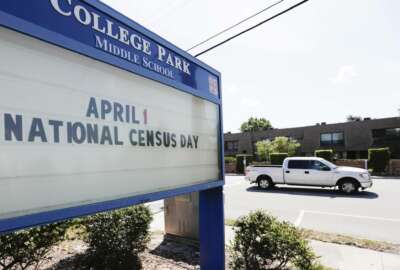
Agencies team up to leverage 3D printing in coronavirus fight
In today's Federal Newscast, three federal agencies have signed a Memorandum of Understanding to work together in using 3D printing technology to build devices and...
To listen to the Federal Newscast on your phone or mobile device, subscribe in PodcastOne or Apple Podcasts. The best listening experience on desktop can be found using Chrome, Firefox or Safari.
- Three agencies are working together to accelerate the use of 3D printing to create materials needed to fight the coronavirus. Veterans Affairs, the National Institutes of Health, and the Food and Drug Administration signed a Memorandum of Understanding, laying out each of their roles in leveraging the technology during the pandemic.
- Virtual services from the Veterans Benefits Administration are being expanded during the coronavirus pandemic. VBA closed 56 regional offices to the public in mid-March. But VBA says it’s continuing most services by phone or the web. VBA employees will work with veterans through VA’s Video Connect service. It will also schedule informal conference hearings and other benefit evaluations by phone or video conference. In-person benefit briefings for transitioning service members are postponed until further notice. But transitioning service members can ask for counseling by phone or video.
- U.S. Transportation Command leader Gen. Steve Lyons says he’s concerned about small businesses in the household goods industry. The Defense Department accounts for 20% of the goods moved per year. Military moves are on hold for 60 days due to the coronavirus. The American Moving and Storage Association estimates that will cost companies at least $300 million in revenue. The association is encouraging small moving companies to apply for small business loans through the two trillion dollar stimulus package. (Federal News Network)
- Service members are also hurting financially from the military’s stop move order. One in five military families say they are paying two housing payments or will be in the next sixty days. That’s according to a new survey conducted by Blue Star Families. Military families are facing financial hardships because they made plans to move to new orders, but those plans have been postponed by the Defense Department due to the coronavirus. The survey also found 56% of military spouses lost their jobs or saw reduced hours. (Federal News Network)
- The Navy has started removing the crew of the aircraft carrier Theodore Roosevelt as coronavirus infections continue to mount on board. As of late last week, the Navy had planned to isolate sailors onboard the ship and test every one of them. But in a letter to senior leaders, the ship’s captain warned that the cramped quarters on a carrier are an ideal environment for COVID-19 to spread, and testing can’t change that. Navy officials say they’re working with local authorities in Guam to find space for the more than 4,000 sailors, but some will need to stay aboard for essential functions, like operating the carrier’s nuclear plant. (Federal News Network)
- Households don’t need to fill out the 2020 census before receiving a coronavirus stimulus check from the IRS. That’s just one of the rumors the Census Bureau is addressing as part of its campaign against misinformation. The bureau is using an artificial intelligence-powered algorithm to monitor for false or misleading information on public social media posts. Once it flags posts, the bureau works with social media companies to update or remove posts that would discourage people from responding to the census. (Federal News Network)
- The Atlantic Council, Accenture and SAIC are leading an effort to develop some much-needed reforms for the Department of Homeland Security. The Future of DHS Project will bring together experts in homeland and national security try to improve all parts of DHS. There will be six study groups focusing on everything from streamlining oversight to workplace challenges. Former Secretaries of Homeland Security Michael Chertoff and Jeh Johnson are the co-chairmen of the project. It also includes former Secretary Janet Napolitano and former Acting Secretaries Rand Beers and Kevin McAleenan.
- Due to the pandemic, the Federal Employee Viewpoint Survey has been postponed. The Office of Personnel Management says it’s delaying survey collection so agencies can focus on their missions at this time. OPM may tentatively start administering the survey July 13. Federal employees usually get the survey in May. The federal workforce will have six weeks to take the survey once OPM chooses a final date. (Chief Human Capital Officers Council)
- The General Services Administration hired commercial real-estate brokers to negotiate more than a third of all federal leases. And GSA says those brokers have saved the government nearly $700 million over the past three years, getting deals lower than market rate. But the Government Accountability Office says data compiled by GSA doesn’t always get an accurate read on market rates. GAO has asked GSA to address the reliability of the data it uses to calculate cost savings from its broker program.
- The American Federation of Government Employees is suing the controversial impasses panel again. AFGE says the new members of the Federal Service Impasses Panel are not fit to serve because their past experiences and current actions create an anti-union bias. The union says the members weren’t constitutionally appointed to the panel because they aren’t Senate-confirmed. This is the second time AFGE is challenging the impasses panel in court. The union challenged the constitutionality of the panel last year. But the case is stalled in federal district court.
- The Office of Personnel Management has once again asked the Federal Labor Relations Authority for a general statement. OPM wants to establish that provisions known as zipper clauses, are a mandatory subject for new contract bargaining. Zipper clauses prevent additional bargaining during the term of a contract. So, the Authority has issued a proposed rule on whether you have bargain over zipper clauses. Comments due April 30. (Federal Register)
- Industry now has more time to give feedback on how it can benefit from greater access to federal research. The White House Office of Science and Technology Policy has extended the deadline on a request for information about public access to the research, data, and code produced by federal agencies. OSTP will now accept comments until May 6. The RFI stems from a 2013 OSTP memo, and 2019 recommendations from the Government Accountability Office.
- NIH has given industry its first glimpse of what its next mega IT services multiple award contract looks like. The National IT Acquisitions and Assessment Center at NIH is making some significant changes to the fourth version of its governmentwide acquisition contract for health and biomedical-related IT services. The draft solicitation for the CIO–Solutions and Partners 4 or CIO-SP4, GWAC updates three of the ten task areas to include cybersecurity and cloud services. CIO-SP4 is a 15-year contract with a $40 billion ceiling. This new GWAC will replace CIO-SP3, which expires in May 2022. Bloomberg Government estimates that agencies have spent more than $13 billion on CIO-SP3 unrestricted and small business contracts since 2016. Comments on the draft RFP are due by May 15.
Copyright © 2025 Federal News Network. All rights reserved. This website is not intended for users located within the European Economic Area.
Eric White
Eric White is news anchor and Federal Drive producer at Federal News Network.
Follow @FEDERALNEWSCAST
Related Stories
Related Topics
All News
Blue Star Families
Census Bureau
Covid-19
Department of Homeland Security
Federal Drive
Federal Employee Viewpoint Survey
Federal Labor Relations Authority
Federal Newscast
Food and Drug Administration
General Services Administration
Health IT
National Institutes of Health
National IT Acquisitions and Assessment Center
Steve Lyons
Technology
Veterans Affairs
Veterans Benefits Administration





